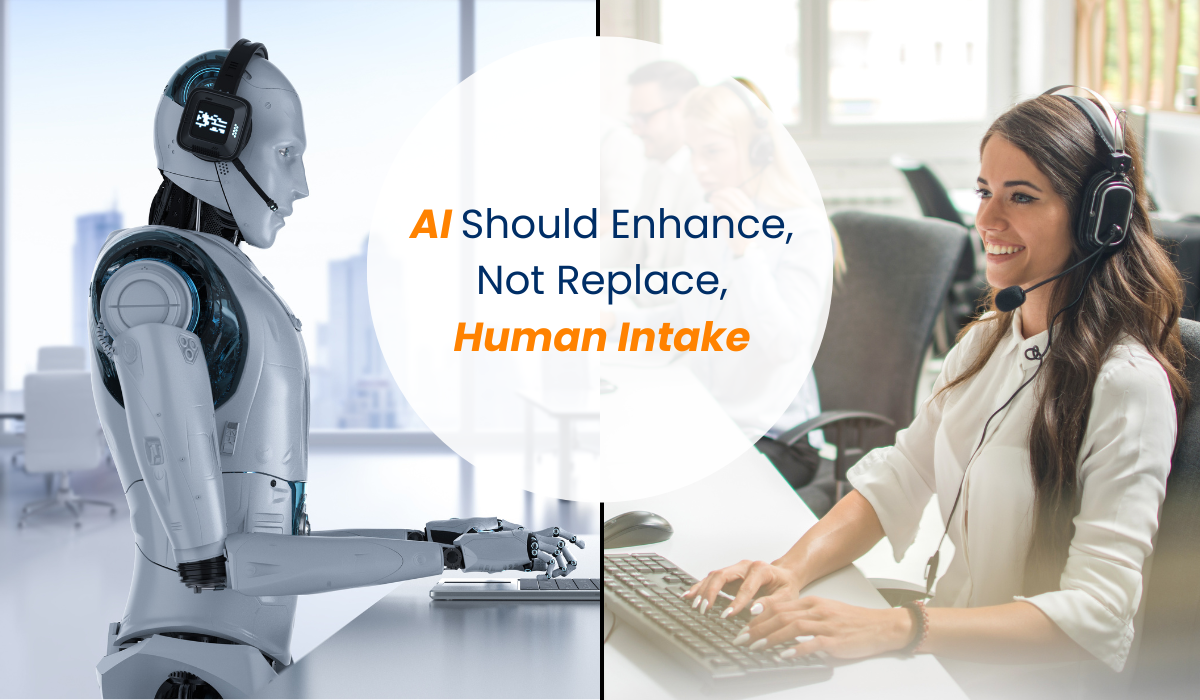AI is making waves across industries, and the legal sector is no exception. Tech experts predict that AI-driven automation will soon take over many call centers. But when it comes to mass tort and personal injury law, human intake is not just relevant—it’s essential.
While AI can streamline certain processes and enhance efficiency, it simply can’t replace the empathy, trust, and personal connection that human intake specialists provide. Here’s why human-driven intake will continue to outperform AI in these high-stakes legal areas.
1. AI Can Handle the Basics, But Humans Make the Difference
AI is fantastic for routine tasks—sorting leads, answering basic inquiries, and directing calls to the right department. It’s a useful tool for speeding up the intake process and making sure no lead falls through the cracks.
But when it comes to making that crucial first call to a potential client, especially in personal injury or mass tort cases, nothing beats a human voice. People who’ve experienced trauma or harm want to connect with someone who listens and understands, not a machine programmed to follow a script. It’s during these sensitive moments that human empathy, tone, and trust-building make all the difference.
2. Emotional Intelligence Trumps AI in Complex Cases
Mass tort and personal injury cases involve individuals who are going through some of the most difficult experiences of their lives. They’re often dealing with significant physical, emotional, or financial stress. These aren’t your typical customer service inquiries—they’re deeply personal and often emotionally charged conversations.
AI might be able to handle factual questions, but it can’t respond to emotions in real-time. A trained human intake specialist, on the other hand, can adjust their tone, empathize with the client’s situation, and offer genuine support—building a level of trust that AI simply can’t replicate.
3. Legal Regulations Will Slow AI’s Role in Outbound Calls
In the legal industry, trust is everything, and the client’s experience starts with that initial intake conversation. Government regulations are beginning to require transparency around AI-driven interactions, and it’s likely we’ll soon see mandatory disclaimers for AI use in outbound calls.
For a client dealing with a life-altering injury or trauma, discovering that they’re talking to a machine instead of a real person could be a major red flag. In this context, the human touch remains invaluable. Clients need to feel that someone is truly listening, and while AI might be useful for managing large volumes of inquiries, it will never replace the personal connection that leads to lasting client relationships.
4. AI Can’t Handle the Nuanced Consultations Clients Need
After that first intake call, the follow-up consultations are where the real work happens. Clients need to share the details of their case, explore legal options, and get the expert guidance that will help them decide whether to move forward. These conversations are intricate, often touching on deeply personal issues, and they require a level of care and expertise that AI cannot provide.
AI can help with initial sorting and FAQs, but when it comes to handling the complexities of an ongoing legal case, it falls short. Only a skilled human can navigate the specifics of a case and deliver personalized, accurate guidance.
5. Mass Tort and Personal Injury Clients Value Empathy Over Efficiency
For many potential clients in mass tort or personal injury cases, their first contact with a law firm is during a time of crisis. They’re looking for reassurance, guidance, and a sense of trust. This demographic—often older or managing serious health conditions—requires patience, understanding, and real human interaction.
AI may be efficient, but it can’t offer the personal reassurance these clients need. Intake specialists, on the other hand, can adjust their approach based on the client’s emotional state, offering comfort and a real sense of support. This human element is key to turning a lead into a long-term client.
6. AI Should Enhance, Not Replace, Human Intake
At the end of the day, AI isn’t the enemy—it’s a tool. It can help law firms run more efficiently by taking on repetitive tasks, flagging high-priority leads, and providing valuable insights for decision-making. But when it comes to the client-facing side of things, it’s clear that human interaction remains critical.
In personal injury and mass tort cases, the key to success is empathy, trust, and the ability to connect with clients on a deeper level. AI can support intake teams by handling administrative tasks in the background, but it’s the human agents who build relationships, earn trust, and ultimately drive results.
The Bottom Line for Law Firms
AI is transforming industries and enhancing efficiency across the board, but it’s not replacing the people behind the scenes—especially in high-touch, high-emotion fields like personal injury and mass tort law. While AI can play a supporting role, the core of successful legal intake remains with human specialists who bring empathy, understanding, and a personal touch that technology can’t replicate.
In this evolving landscape, the firms that thrive will be the ones that integrate AI smartly while keeping their human intake teams front and center, delivering the compassionate service that clients truly value.


